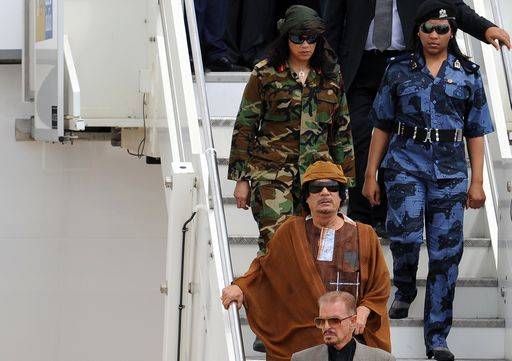Scandals and Controversies. Gheddafi's Visit Leaves Italians Dumbfounded
Colonel Muammar Gaddafi’s two-day visit to Italy will be remembered for the inevitable controversy surrounding the Libyan leader who, as usual, is the center of attention because of his words and actions.
The trip was intended to strengthen the ties between Tripoli and Rome. In fact, Italy and Libya had signed a pact in 2008 that ended tensions between the two countries which began with the Italian colonization of Libya. One year ago, Gaddafi made his first trip to Italy to mark the anniversary of the event. His recent visit, which took place just a few days ago, had political and commercial aims, although the media all over the world focused mainly on the Colonel’s “spectacle.” And this time the show included 30 thoroughbred Berber horses and 40 “Amazonian” bodyguards that usually accompany the Libyan leader as well as the magnificent tent set up in the garden outside the Libyan ambassador’s residence where the Colonel spent his Roman trip.
The exotic, Arabian night-style atmosphere made quite an impression on the Italian imagination, even though the highlight undoubtedly was Gaddafi’s lectures held at the Libyan Cultural Center on two different days, with 500 young women attending on the first and 200 on the second.
The women were hired and paid about 100 U.S. dollars by an agency to attend the lecture; the agency said it would not pay women who talked to the press. The women had also been told to dress conservatively and were each given a copy of the Quran along with the Green Book on the Libyan revolution.
The gatherings will also be remembered for some remarkable statements the Colonel made that provoked criticism and disappointment, especially among Catholics. “Islam should become the religion of all of Europe,” declared Gaddafi. He also asserted that “women are more respected in Libya than in the West.” While this may be true in Libya, how could he overlook the many female victims of religious fundamentalism in the Islamic world? Gaddafi also generously offered assistance in finding Libyan husbands for the young women attending the lectures. Rumors suggest that following the events at least three women decided to convert to Islam even though there is no evidence to support this claim.
Inevitably the Libyan leader’s visit was defined by the media as a spectacle and an extravaganza, while the opposition as well as some in the center-right coalition criticized Silvio Berlusconi for paying tribute to the Colonel, focusing only on business, and ignoring his provocative statements that lack the diplomatic attitude typical in meetings between heads of State. “Italy has become Gaddafi’s Disneyland, an amusement park for his senile vanities."
The reason, unfortunately, is politics,” wroteFareFuturo, a foundation who supports Gianfranco Fini, a center-right politician who is currently the Speaker of the Low Chamber and is having a highly-publicized disagreement with his former ally, Silvio Berlusconi. Another representative of the governing coalition, Mario Borghezio, who belongs to the anti-immigration partyLega Nord (The Northern League), could not hide his disappointment: “Gaddafi’s words show his dangerous ‘Islamization’ project for Europe.” The daily Catholic newspaper L’Avvenire criticized Gaddafi’s visit in a front-page editorial entitled, “The Colonel’s Proselytism.”
The criticism was also directed against the Italian media for “accommodating” his “spectacle.” Rocco Buttiglione, the President of a center-Catholic party, the UDC (Unione di Centro) asked the Libyan leader a rather provocative question (through the media) that, of course, was rhetorical: “If I went to Tripoli to demand that Libyans convert to Christianity, what are the odds that I would return in one piece?” Rosy Bindi, one of the most important representatives from the main opposition party, the Democratic Party, said that the image of hundreds of Italian women being bused in at Colonel Gaddafi’s whim was a “humiliating violation” of their dignity. Silvio Berlusconi’s reply harshly defined the critics as “prisoners of outdated ideas.”
The two leaders demonstrated mutual respect and admiration in all of their public appearances together.They met for talks in the tent which has always hosted Gaddafi on foreign visits, and discussed industrial cooperation projects and prospects for Italian firms in Libya, aides said. The two leaders also attended an equestrian show for which Libya provided 30 horses and riders. Italian military police also took part in the show with their own horses. A gala dinner with about 800 guests followed the exhibition. Some of the biggest names in Italian business pulled strings to be invited, seeing the gala as an occasion to pick up lucrative contracts in the energy-rich North African country.
During the party the Colonel made one more “memorable” comment: “Libya, with Italy’s support, asks the EU to provide at least 5 billion dollars a year to stop illegal immigration, otherwise Europe could one day become part of Africa. It could become black, because millions want to come here.” Once again, negative reactions abounded: “Ever since Gaddafi arrived here, he’s been taking this country for a ride, like buying women,” said Stefano Pedica, a senator from the opposition Italy of Values party. Several commentators also accused Berlusconi of sacrificing principles and dignity for the sake of trade and investment ties with Libya, whose huge sovereign wealth fund has invested heavily in Italy in recent years.
Even after Colonel Gaddafi’s departure, the debate did not end. In fact, it was noted that President of the Republic Giorgio Napolitano had not been informed of the Libyan leader’s official visit to Italy, neither by the Minister of Foreign Affairs nor by the Premier’s staff. It was an unusual turn of events that went against the usual protocol followed in such cases.
Edited by Giulia Prestia








































i-Italy
Facebook
Google+
This work may not be reproduced, in whole or in part, without prior written permission.
Questo lavoro non può essere riprodotto, in tutto o in parte, senza permesso scritto.